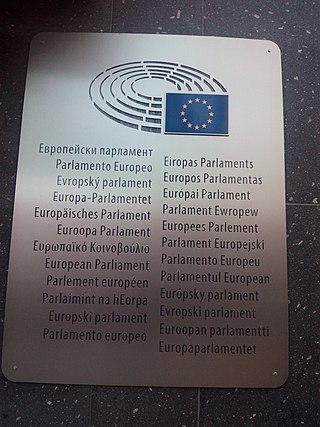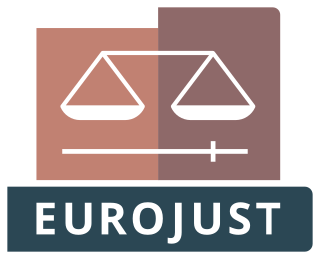
The Council of the European Union, often referred to in the treaties and other official documents simply as the Council, and informally known as the Council of Ministers, is the third of the seven Institutions of the European Union (EU) as listed in the Treaty on European Union. It is one of two legislative bodies and together with the European Parliament serves to amend and approve or veto the proposals of the European Commission, which holds the right of initiative.

The European Union (EU) is a supranational political and economic union of 27 member states that are located primarily in Europe. The union has a total area of 4,233,255 km2 (1,634,469 sq mi) and an estimated total population of over 448 million. The EU has often been described as a sui generis political entity combining the characteristics of both a federation and a confederation.
Freedom of information laws allow access by the general public to data held by national governments and, where applicable, by state and local governments. The emergence of freedom of information legislation was a response to increasing dissatisfaction with the secrecy surrounding government policy development and decision making. In recent years Access to Information Act has also been used. They establish a "right-to-know" legal process by which requests may be made for government-held information, to be received freely or at minimal cost, barring standard exceptions. Also variously referred to as open records, or sunshine laws, governments are typically bound by a duty to publish and promote openness. In many countries there are constitutional guarantees for the right of access to information, but these are usually unused if specific support legislation does not exist. Additionally, the United Nations Sustainable Development Goal 16 has a target to ensure public access to information and the protection of fundamental freedoms as a means to ensure accountable, inclusive and just institutions.

The European Union Intellectual Property Office, founded in 1994, is the European Union Agency responsible for the registration of the European Union trade mark (EUTM) and the registered Community design (RCD), two unitary intellectual property rights valid across the 27 Member States of the EU. Every year, it registers an average of 135 000 EU trade marks and close to 100 000 designs. From 1 December 2025, the EUIPO will be responsible for the registration of Geographical Indications (GIs) for craft and industrial products. The EUIPO is also responsible for maintaining an Orphan Works Registry. Registered works have certain permitted acts under the Orphan Works Directive.

The European Court of Auditors is the supreme audit institution of the European Union (EU). It was established in 1975 in Luxembourg and is one of the seven EU institutions. The Court comprises one member from each EU member state supported by approximately 800 civil servants.

The Official Journal of the European Union is the official gazette of record for the European Union (EU). It is published every working day in all of the official languages of the member states of the EU. Only legal acts published in the Official Journal are binding.

Eur-Lex is an official website of European Union law and other public documents of the European Union (EU), published in 24 official languages of the EU. The Official Journal (OJ) of the European Union is also published on EUR-Lex. Users can access EUR-Lex free of charge and also register for a free account, which offers extra features.

The European Union (EU) has 24 official languages, of which three – English, French and German – have the higher status of "procedural" languages of the European Commission. Irish previously had the lower status of "treaty language" before being upgraded to an official and working language in 2007. However, a temporary derogation was enforced until 1 January 2022. The three procedural languages are those used in the day-to-day workings of the institutions of the EU. The designation of Irish as a "treaty language" meant that only the treaties of the European Union were translated into Irish, whereas Legal Acts of the European Union adopted under the treaties did not have to be. Luxembourgish and Turkish, which have official status in Luxembourg and Cyprus, respectively, are the only two official languages of EU member states that are not official languages of the EU. In 2023, the Spanish government requested that its co-official languages Catalan, Basque, and Galician be added to the official languages of the EU.

The European Union Agency for Criminal Justice Cooperation (Eurojust) is an agency of the European Union (EU) dealing with judicial co-operation in criminal matters among agencies of the member states. It is seated in The Hague, Netherlands. Established in 2002, it was created to improve handling of serious cross-border and organised crime by stimulating investigative and prosecutorial co-ordination.

The agencies of the European Union are bodies of the European Union and the Euratom established as juridical persons through secondary EU legislation and tasked with a specific narrow field of work.

European Union citizenship is afforded to all nationals of member states of the European Union (EU). It was formally created with the adoption of the 1992 Maastricht Treaty, at the same time as the creation of the EU. EU citizenship is additional to, as it does not replace, national citizenship. It affords EU citizens with rights, freedoms and legal protections available under EU law.

The Publications Office of the European Union is the official provider of publishing services and data, information and knowledge management services to all EU institutions, bodies and agencies. This makes it the central point of access to EU law, publications, open data, research results, procurement notices, and other official information.

A European Documentation Centre (EDC) is a body designated by the European Commission to collect and disseminate publications of the European Union for the purposes of research and education. There are 400 such centers in all member states of the EU. The mandate of an EDC is to receive all official EU publications, documents, contracts and electronic databases then make them available to researchers, educators, students, and interested members of the general public. The centers are also legal depositories of Acquis communautaire (EU law). Although primarily academic in nature, anyone can visit an EDC to consult official EU publications.

The Body of European Regulators for Electronic Communications (BEREC) is the body in which the regulators of the telecommunications markets in the European Union work together. Other participants are the representatives of the European Commission, as well as telecommunication regulators from the member states of the EEA and of states that are in the process of joining the EU.

The area of freedom, security and justice (AFSJ) of the European Union (EU) is a policy domain concerning home affairs and migration, justice as well as fundamental rights, developed to address the challenges posed to internal security by collateral effects of the free movement of people and goods in the absence of border controls or customs inspection throughout the Schengen Area, as well as to safeguard adherence to the common European values through ensuring that the fundamental rights of people are respected across the EU.

A European Union laissez-passer is a travel document issued to civil servants and members of the institutions of the European Union. It is proof of privileges and immunities the holders enjoy. The document is valid in all countries of the European Union as well as in over 100 other countries. In 2006, the European Commission issued or renewed 2,200 laissez-passer, and other agencies may issue the document as well.

The main bodies of the European Union and the Euratom are:
The European Legislation Identifier (ELI) ontology is a vocabulary for representing metadata about national and European Union (EU) legislation. It is designed to provide a standardized way to identify and describe the context and content of national or EU legislation, including its purpose, scope, relationships with other legislations and legal basis. This will guarantee easier identification, access, exchange and reuse of legislation for public authorities, professional users, academics and citizens. ELI paves the way for knowledge graphs, based on semantic web standards, of legal gazettes and official journals.
Before data.europa.eu, the EU Open Data Portal was the point of access to public data published by the EU institutions, agencies and other bodies. On April 21, 2021 it was consolidated to the data.europa.eu portal, together with the European Data Portal: a similar initiative aimed at the EU Member States.
The Health Emergency Preparedness and Response Authority (HERA) is a directorate-general of the European Commission created to prepare the EU for a future pandemic and to avoid the mistakes made during the EU's response to the COVID-19 pandemic. European Commission President Ursula von der Leyen first announced plans for such a body in 2020. On 15 September 2021, the EU announced the launch of HERA and the service was established as a directorate-general of the European Commission on 16 September. HERA has been operational since early 2022.










